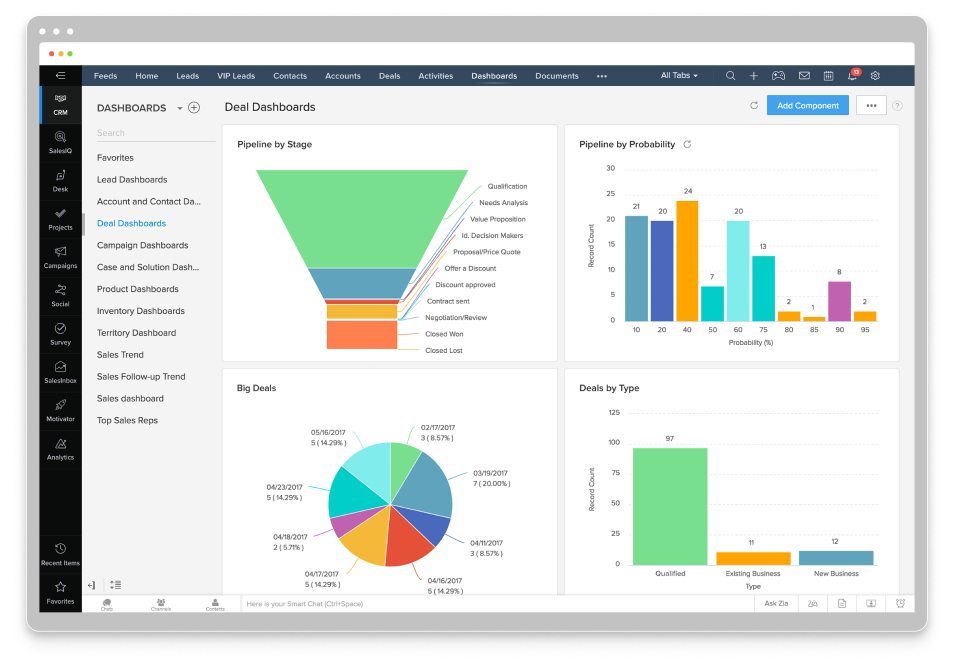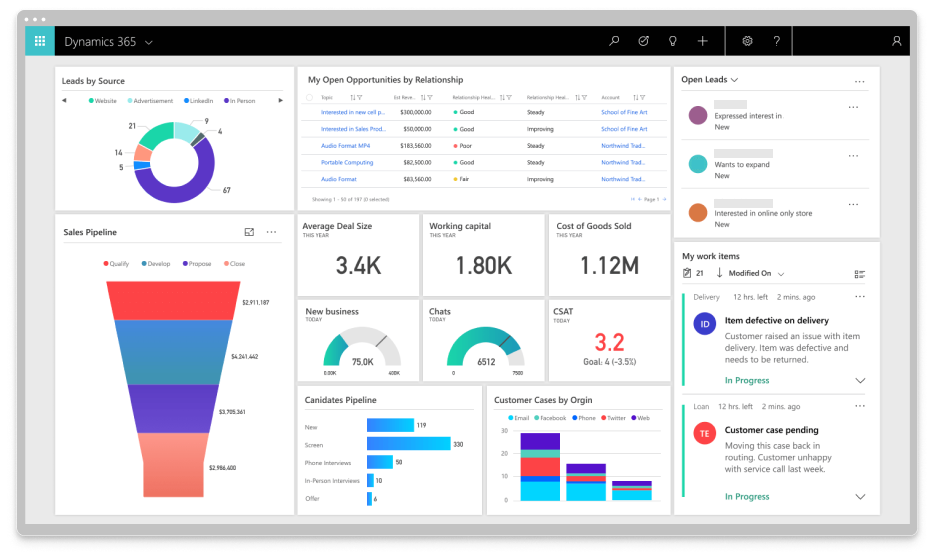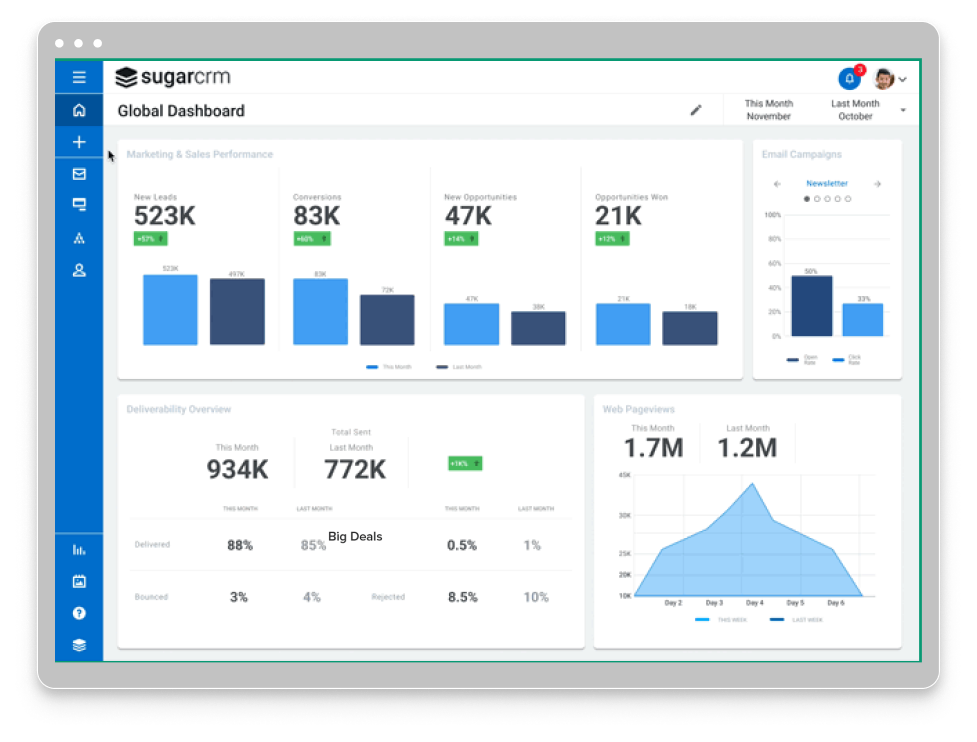Exploring the Top Salesforce Alternatives for 2024
In today’s highly competitive business landscape, finding the right CRM platform that meets your unique needs can make all the difference in achieving success. While Salesforce has long been a dominant player in the market, it’s also essential to consider the top alternatives.
From robust features and scalability to user-friendly interfaces and affordability, these alternatives offer a range of benefits that may benefit your business. Whether you’re a small startup looking for cost-effective options or a larger enterprise in need of enterprise-level capabilities, there’s a platform out there designed to cater to your specific requirements.
In this article, we highlight the top Salesforce alternatives for 2024, examining their unique features, pros and cons, and suitability for various industries. Stay tuned to gain valuable insights into the leading CRM platforms and make an informed decision about the right one for your business’s growth and success.
Factors to Consider When Choosing a CRM Platform
When selecting a Customer Relationship Management (CRM) platform, several key factors demand attention to ensure alignment with your business’s unique requirements.
- Scalability: It is imperative to evaluate the scalability of the chosen CRM platform. As your business expands, the CRM should seamlessly grow to accommodate an increasing customer base and adapt to evolving needs.
- User-Friendliness: The user-friendliness of the platform’s interface is of paramount importance. A CRM system should empower employees to adapt swiftly without extensive training, ensuring maximum productivity right from the initial implementation.
- Range of Features: The variety of features offered by the CRM platform plays a crucial role. Businesses have diverse needs, and assessing whether the platform provides the tools to streamline sales, marketing, and customer service processes is essential.
- Integration Capabilities: Organizations should pay attention to the integration capabilities of the CRM. Seamless integration with existing software and applications can significantly enhance overall efficiency and productivity by creating a cohesive digital ecosystem.
- Cost Considerations: Cost is undeniably a significant factor for most businesses. While Salesforce may be a market leader, exploring more cost-effective alternatives that offer comparable functionalities is advisable. This ensures you get the best value for your investment without compromising on essential features.
Top Salesforce Alternatives in 2024
- HubSpot CRM: A Comprehensive Alternative to Salesforce

- Overview: HubSpot CRM is a compelling alternative to Salesforce, renowned for its robust features tailored for efficient customer relationship management. This overview delves into its strengths, integrations, user-friendliness, and affordability.
- Integration and Unified Approach: A standout feature of HubSpot CRM is its seamless integration with other HubSpot products, fostering a unified approach to marketing, sales, and customer service. This ensures a cohesive strategy across diverse business functions.
- User-Friendly Interface: HubSpot CRM boasts a clean and intuitive interface, ensuring teams can quickly adapt to its functionalities without extensive training. This user-friendly design maximizes productivity from the initial implementation.
- Key Features: The platform’s key features, including contact management, deal tracking, and email tracking, contribute to a comprehensive solution suitable for businesses of various sizes. These tools facilitate efficient customer relationship management.
- Limitations for Complex Needs: It’s crucial to acknowledge that HubSpot CRM may not be optimal for companies with intricate sales processes or those requiring advanced reporting and analytics. While it forms a solid foundation for customer relationship management, some of the advanced features essential for larger enterprises might be lacking.
- Marketing Automation Capabilities: HubSpot CRM’s potent marketing automation capabilities enable businesses to streamline marketing efforts and effectively nurture leads. Its seamless integration with other HubSpot tools empowers users to establish a cohesive and efficient system for managing customer interactions.
- Affordability and Plans: A standout advantage of HubSpot CRM is its affordability. It offers a free version encompassing essential features like contact management, email marketing, and lead generation. For businesses eyeing expansion, paid plans are available, introducing additional features such as advanced reporting and sales automation.
- Customization Considerations: However, customization options may not be as extensive as Salesforce, potentially limiting businesses with complex processes or unique requirements. Customer support for the free version might be more limited than the paid plans.
In summary, HubSpot CRM is an excellent choice for businesses seeking a user-friendly and cost-effective CRM solution. Its robust features and integration capabilities position it as a viable alternative to Salesforce, mainly catering to smaller companies or those prioritizing inbound marketing strategies.
2. Zoho CRM: A Flexible and Affordable Salesforce Alternative

- Overview: Zoho CRM stands out as a compelling alternative for businesses seeking an alternative to Salesforce. Renowned for its affordability and comprehensive feature set, Zoho CRM caters to companies of all sizes, offering a user-friendly interface and a range of tools for lead and contact management, sales automation, and more.
- Feature Set and Integration Capabilities: Zoho CRM’s extensive feature set includes customizable dashboards and reports, providing valuable insights into the sales pipeline and customer interactions. The platform excels in integration capabilities, allowing seamless connections with other Zoho applications or third-party software. This flexibility enables businesses to create a tailored CRM ecosystem aligned with their unique needs.
- Flexibility and Scalability: Known for its flexibility and scalability, Zoho CRM adapts well to businesses of varying sizes and industries. The platform consolidates sales, marketing, and customer support activities in one centralized system, providing a holistic approach to CRM.
- Pricing Structure: Zoho CRM offers various plans to accommodate different business requirements. The free plan includes basic features like contact management and lead tracking, while paid plans unlock advanced functionalities such as workflow automation and sales forecasting. The platform, overall, provides excellent value for money.
- Challenges and Learning Curve: However, some users have reported challenges with Zoho CRM’s user interface, particularly for those new to CRM systems. The platform’s extensive features and customization options may require a learning curve for teams to fully leverage its capabilities. Additionally, customer support has been a point of contention, with reports of slow response times and limited assistance.
Despite these minor drawbacks, Zoho CRM remains a strong contender among Salesforce alternatives. Its extensive integration capabilities, affordability, and adaptability make it an attractive option for businesses seeking a comprehensive CRM solution.
3. Microsoft Dynamics 365: A Comprehensive CRM and ERP Solution

- Overview: Microsoft Dynamics 365 emerges as a robust CRM and ERP solution, seamlessly integrating with various Microsoft products. This platform encompasses multiple features, including sales automation, customer service management, marketing automation, and more, facilitating a unified approach to customer relationship management and business operations.
- Integration and Functionality: Microsoft Dynamics 365 stands out for its seamless integration with Microsoft products like Office 365 and Power BI, enhancing collaboration and leveraging familiar tools within the organization. The platform provides advanced analytics and reporting, delivering valuable insights into sales and marketing performance.
- Pricing and Plans: Despite offering a unified sales, marketing, customer service, and operations system, Microsoft Dynamics 365’s pricing structure may need to be revised for smaller businesses with limited budgets. However, the platform caters to diverse needs with different plans, ranging from basic functionalities to advanced features like artificial intelligence-driven insights and predictive analytics, making it suitable for larger enterprises.
- Complexity and User Experience: While Microsoft Dynamics 365 offers enterprise-level capabilities, some users have reported challenges with its complex user interface, particularly for non-technical users. Navigating the platform and configuring customizations may demand higher technical expertise or IT assistance. Customer support has garnered mixed reviews, with reports of slow response times and difficulty in issue resolution.
In the realm of Salesforce alternatives, Microsoft Dynamics 365 stands strong, especially for businesses already invested in Microsoft products. Its comprehensive functionalities, integration capabilities, and enterprise-level features position it as a robust CRM solution, albeit with pricing and user interface complexity considerations.
4. Pipedrive: Streamlining Sales Pipeline Management

- Overview: Pipedrive is a CRM platform tailor-made for sales teams, offering a simplified and intuitive interface. Its primary focus is on efficient pipeline management, aiding businesses in tracking deals, managing contacts, and automating repetitive tasks to enhance overall sales effectiveness.
- Sales Pipeline Management and Features: Pipedrive provides a user-friendly interface and intuitive features specifically designed for sales teams. The platform’s visual sales pipeline offers a clear overview of sales activities, facilitating easy tracking of progress and identification of bottlenecks. Automation features like email tracking and task reminders contribute to streamlining sales processes, and integration with third-party applications like Google Workspace and Slack enhances collaboration within the organization.
- Pricing and Plans: Pipedrive caters to businesses of all sizes with different plans, offering a range of functionalities from essential to advanced features like workflow automation and revenue forecasting. While it may boast fewer advanced features than some alternatives, Pipedrive’s commitment to sales pipeline management makes it a reliable choice for organizations looking to enhance their sales processes.
- Limitations and Considerations: Despite its strengths, there may be better solutions than Pipedrive for businesses with complex marketing or customer service needs. Its primary focus on sales might limit its capabilities in other areas, and some users have reported limitations in customization options and customer support responsiveness.
Pipedrive shines as a solid choice for businesses prioritizing efficient sales pipeline management. Its user-friendly interface, automation features, and integration capabilities make it a valuable CRM solution, particularly for sales-focused organizations.
5. SugarCRM: Unleashing Customization Power

- Overview: SugarCRM is an open-source CRM platform that offers businesses unparalleled flexibility and customization options. With a comprehensive set of features covering contact and lead management, sales automation, customer support, and marketing automation, SugarCRM positions itself as a versatile solution adaptable to diverse business needs.
- Flexibility and Customization: SugarCRM’s open-source nature empowers businesses to tailor the platform extensively, catering to unique requirements and complex workflows. The ability to configure modules, fields, and layouts ensures seamless integration with existing workflows. Moreover, SugarCRM provides various deployment options, including cloud-based and on-premises solutions, offering businesses flexibility and control over their CRM environment.
- Pricing and Editions: SugarCRM offers different editions to accommodate businesses of all sizes. The free, open-source version provides basic functionalities, while advanced paid versions include advanced reporting and workflow automation features. Although the paid versions may be comparatively more expensive, the platform’s customization capabilities and flexibility make it an attractive option for businesses with unique requirements.
- Limitations and Considerations: Despite its strengths, leveraging SugarCRM’s customization options may require technical expertise or support from IT professionals. The platform’s open-source nature could result in a steeper learning curve, especially for users unfamiliar with open-source software. Businesses considering SugarCRM should be prepared for potential technical challenges related to customization and maintenance.
In the landscape of Salesforce alternatives, SugarCRM stands tall as a robust choice for businesses seeking a flexible and customizable CRM solution. Its extensive customization options, deployment flexibility, and range of editions position SugarCRM as a versatile CRM platform capable of meeting the distinct needs of diverse businesses.
Conclusion
In comparing the top Salesforce alternatives, it’s essential to consider various factors such as scalability, user-friendliness, features, integration capabilities, and cost. Each of the alternatives discussed offers its own set of advantages and disadvantages. HubSpot CRM provides a comprehensive solution with seamless integration but may need more advanced features for larger enterprises. Zoho CRM offers affordability and extensive features but may be overwhelming for some users. Microsoft Dynamics 365 integrates well with other Microsoft products but can be more complex to navigate. Pipedrive excels in sales pipeline management but may not be as suitable for broader CRM needs. SugarCRM provides flexibility and customization options but may require technical expertise.
Ultimately, the right Salesforce alternative for your business depends on your specific requirements and budget. It’s recommended to thoroughly evaluate each platform’s features, user reviews, and customer support before deciding.
With the right CRM platform, you can streamline your sales, marketing, and customer service processes, ultimately driving growth and success in 2024 and beyond.
Load more...